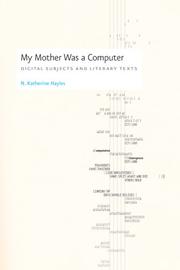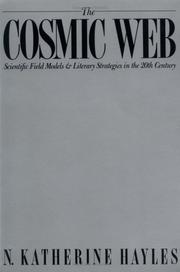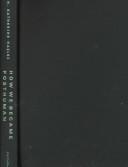| Listing 1 - 10 of 18 | << page >> |
Sort by
|
Book
ISBN: 0801497019 9781501722950 1501722956 0801422620 9780801422621 9780801497018 1501722964 1501727923 Year: 2018 Publisher: Cornell University Press
Abstract | Keywords | Export | Availability | Bookmark
 Loading...
Loading...Choose an application
- Reference Manager
- EndNote
- RefWorks (Direct export to RefWorks)
N. Katherine Hayles here investigates parallels between contemporary literature and critical theory and the science of chaos. She finds in both scientific and literary discourse new interpretations of chaos, which is seen no longer as disorder but as a locus of maximum information and complexity. She examines structures and themes of disorder in The Education of Henry Adams, Doris Lessing's Golden Notebook, and works by Stanislaw Lem. Hayles shows how the writings of poststructuralist theorists including Barthes, Lyotard, Derrida, Serres, and de Man incorporate central features of chaos theory.
Literature --- anno 1900-1999 --- Chaotic behavior in systems in literature --- Chaotisch gedrag in de systemen in de literatuur --- Comportement chaotique dans les systèmes en littérature --- Chaotic behavior in systems in literature. --- Literature, Modern --- History and criticism. --- History and criticism --- Literature [Modern ] --- 20th century --- Literature, Modern - 20th century - History and criticism. --- Chaos theory

ISBN: 0226321487 0226321479 9786612538056 1282538055 0226321495 9780226321493 9780226321479 9780226321486 Year: 2005 Publisher: Chicago : University of Chicago Press,
Abstract | Keywords | Export | Availability | Bookmark
 Loading...
Loading...Choose an application
- Reference Manager
- EndNote
- RefWorks (Direct export to RefWorks)
We live in a world, according to N. Katherine Hayles, where new languages are constantly emerging, proliferating, and fading into obsolescence. These are languages of our own making: the programming languages written in code for the intelligent machines we call computers. Hayles's latest exploration provides an exciting new way of understanding the relations between code and language and considers how their interactions have affected creative, technological, and artistic practices. My Mother Was a Computer explores how the impact of code on everyday life has become comparable to that of speech and writing: las anguage and code have grown more entangled, the lines that once separated humans from machines, analog from digital, and old technologies from new ones have become blurred. My Mother Was a Computer gives us the tools necessary to make sense of these complex relationships. Hayles argues that we live in an age of intermediation that challenges our ideas about language, subjectivity, literary objects, and textuality. This process of intermediation takes place where digital media interact with cultural practices associated with older media, and here Hayles sharply portrays such interactions: how code differs from speech; how electronic text differs from print; the effects of digital media on the idea of the self; the effects of digitality on printed books; our conceptions of computers as living beings; the possibility that human consciousness itself might be computational; and the subjective cosmology wherein humans see the universe through the lens of their own digital age. We are the children of computers in more than one sense, and no critic has done more than N. Katherine Hayles to explain how these technologies define us and our culture. Heady and provocative, My Mother Was a Computer will be judged as her best work yet.
Computers in literature --- Homme et ordinateur [Interaction entre ] --- Human-computer interaction --- Interactie tussen mens en computer --- Interaction entre l'homme et l'ordinateur --- Mens-computer interactie --- Réalité virtuelle --- Virtual reality --- Virtuele realiteit --- Virtuele werkelijkheid --- Computational intelligence --- User-centered system design --- Computer Science --- Sociolinguistics --- Programming languages (Electronic computers) --- Literature and science --- Literature and technology --- American literature --- Semantics --- Social aspects --- History and criticism --- Computational intelligence. --- Human-computer interaction. --- Computers in literature. --- Virtual reality. --- History and criticism. --- Environments, Virtual --- Virtual environments --- Virtual worlds --- Computer-human interaction --- Human factors in computing systems --- Interaction, Human-computer --- Intelligence, Computational --- Computer simulation --- Reality --- Human engineering --- User interfaces (Computer systems) --- Artificial intelligence --- Soft computing --- E-books --- 20th century --- Linguistique --- Computational linguistics --- Informatique --- Programming languages (Electronic computers) - Semantics - Social aspects --- American literature - 20th century - History and criticism --- language, programming, code, greg egan, intermediation, computation, cosmology, subjectivity, virtual, simulation, the mask, stanislaw lem, digital, analog, transmitting, patchwork girl, shelley jackson, connectivity, cryptonomicon, neal stephenson, figurative, performance, media, etext, print, constraint, information, writing, speech, textuality, literature, nonfiction, communication, text, self, consciousness, man vs machine. --- Interaction homme-ordinateur --- Ordinateurs --- Littérature américaine --- Dans la littérature --- 20e siècle --- Histoire et critique

ISBN: 0801417422 9781501722974 1501722972 9780801417429 0801492904 1501727931 Year: 1984 Publisher: Ithaca : Cornell University Press,
Abstract | Keywords | Export | Availability | Bookmark
 Loading...
Loading...Choose an application
- Reference Manager
- EndNote
- RefWorks (Direct export to RefWorks)
From the central concept of the field-which depicts the world as a mutually interactive whole, with each part connected to every other part by an underlying field- have come models as diverse as quantum mathematics and Saussure's theory of language. In The Cosmic Web, N. Katherine Hayles seeks to establish the scope of the field concept and to assess its importance for contemporary thought. She then explores the literary strategies that are attributable directly or indirectly to the new paradigm; among the texts at which she looks closely are Robert Pirsig's Zen and the Art of Motorcycle Maintenance, Nabokov's Ada, D. H. Lawrence's early novels and essays, Borges's fiction, and Thomas Pynchon's Gravity's Rainbow.
Literature and science --- Literature, Modern --- Littérature et sciences --- Littérature --- History and criticism --- Histoire et critique --- Literature and science. --- History and criticism. --- Littérature et sciences --- Littérature --- Poetry and science --- Science and literature --- Science and poetry --- Science and the humanities --- Literature, Modern - 20th century - History and criticism

ISBN: 9780226321462 0226321452 0226321460 9780226321455 Year: 1999 Publisher: Chicago (Ill.) : University of Chicago press,
Abstract | Keywords | Export | Availability | Bookmark
 Loading...
Loading...Choose an application
- Reference Manager
- EndNote
- RefWorks (Direct export to RefWorks)
In this age of DNA computers and artificial intelligence, information is becoming disembodied even as the "bodies" that once carried it vanish into virtuality. While some marvel at these changes, envisioning consciousness downloaded into a computer or humans "beamed" Star Trek-style, others view them with horror, seeing monsters brooding in the machines. In How We Became Posthuman, N. Katherine Hayles separates hype from fact, investigating the fate of embodiment in an information age. Hayles relates three interwoven stories: how information lost its body, that is, how it came to be conceptualized as an entity separate from the material forms that carry it; the cultural and technological construction of the cyborg; and the dismantling of the liberal humanist "subject" in cybernetic discourse, along with the emergence of the "posthuman."
Réalité virtuelle --- Artificial intelligence. --- Cybernetics. --- Computer science. --- Virtual reality. --- Virtual reality in literature. --- Dans la littérature --- 82:62 --- Literatuur en technologie --- 82:62 Literatuur en technologie --- Cybernétique --- Réalité virtuelle --- 82-3 --- 82-3 Proza. Fictie. Narratologie --- Proza. Fictie. Narratologie --- Artificial intelligence --- Computer science --- Cybernetics --- Virtual reality --- Virtual reality in literature --- Environments, Virtual --- Virtual environments --- Virtual worlds --- Computer simulation --- Reality --- Mechanical brains --- Control theory --- Electronics --- System theory --- Informatics --- Science --- AI (Artificial intelligence) --- Artificial thinking --- Electronic brains --- Intellectronics --- Intelligence, Artificial --- Intelligent machines --- Machine intelligence --- Thinking, Artificial --- Bionics --- Cognitive science --- Digital computer simulation --- Electronic data processing --- Logic machines --- Machine theory --- Self-organizing systems --- Simulation methods --- Fifth generation computers --- Neural computers --- Artificial intelligence. Robotics. Simulation. Graphics --- Thematology --- Intelligence artificielle --- Dans la littérature. --- 82-3 Fiction. Prose narrative --- Fiction. Prose narrative --- Société numérique --- Informatique --- Média
Book
ISBN: 9780231198257 9780231198240 9780231552554 0231198256 0231198248 0231552556 Year: 2021 Publisher: New York
Abstract | Keywords | Export | Availability | Bookmark
 Loading...
Loading...Choose an application
- Reference Manager
- EndNote
- RefWorks (Direct export to RefWorks)
"Since Gutenberg's time, every aspect of print has gradually changed. But the advent of computational media has exponentially increased the pace, transforming how books are composed, designed, edited, typeset, distributed, sold, and read. N. Katherine Hayles traces the emergence of what she identifies as the postprint condition, exploring how the interweaving of print and digital technologies has changed not only books but also language, authorship, and what it means to be human. Hayles considers the ways in which print has been enmeshed in literate societies and how these are changing as some of the cognitive tasks once performed exclusively by humans are now carried out by computational media. Interpretations and meaning-making practices circulate through transindividual collectivities created by interconnections between humans and computational media, which Hayles calls cognitive assemblages. Her theoretical framework conceptualizes innovations in print technology as redistributions of cognitive capabilities between humans and machines. Humanity is becoming computational, just as computational systems are edging toward processes once thought of as distinctively human. Books in all their diversity are also in the process of becoming computational, representing a crucial site of ongoing cognitive transformations. Hayles details the consequences for humanities publications through interviews with scholars and university press professionals and considers the cultural implications in readings of two novels, The Silent History and The Word Exchange, that explore the postprint condition. Spanning fields including book studies, cultural theory, and media archeology, Postprint is a strikingly original consideration of the role of computational media in the ongoing evolution of humanity"--
Book industries and trade --- Digital media --- Cognition. --- Communication and technology. --- Technological innovations. --- Social aspects. --- Cognition --- Communication and technology --- Technological innovations --- Social aspects --- Graphics industry --- Mass communications --- bookselling --- digital media --- publishers --- Book industries and trade - Technological innovations --- Book industries and trade - Social aspects --- Digital media - Social aspects
Book
ISBN: 1501722980 Year: 2018 Publisher: Cornell University Press
Abstract | Keywords | Export | Availability | Bookmark
 Loading...
Loading...Choose an application
- Reference Manager
- EndNote
- RefWorks (Direct export to RefWorks)
From the central concept of the field—which depicts the world as a mutually interactive whole, with each part connected to every other part by an underlying field— have come models as diverse as quantum mathematics and Saussure’s theory of language. In The Cosmic Web, N. Katherine Hayles seeks to establish the scope of the field concept and to assess its importance for contemporary thought. She then explores the literary strategies that are attributable directly or indirectly to the new paradigm; among the texts at which she looks closely are Robert Pirsig’s Zen and the Art of Motorcycle Maintenance, Nabokov’s Ada, D. H. Lawrence’s early novels and essays, Borges’s fiction, and Thomas Pynchon’s Gravity’s Rainbow.
Book
ISBN: 0231552556 Year: 2021 Publisher: New York, New York : Columbia University Press,
Abstract | Keywords | Export | Availability | Bookmark
 Loading...
Loading...Choose an application
- Reference Manager
- EndNote
- RefWorks (Direct export to RefWorks)
Since Gutenberg’s time, every aspect of print has gradually changed. But the advent of computational media has exponentially increased the pace, transforming how books are composed, designed, edited, typeset, distributed, sold, and read. N. Katherine Hayles traces the emergence of what she identifies as the postprint condition, exploring how the interweaving of print and digital technologies has changed not only books but also language, authorship, and what it means to be human.Hayles considers the ways in which print has been enmeshed in literate societies and how these are changing as some of the cognitive tasks once performed exclusively by humans are now carried out by computational media. Interpretations and meaning-making practices circulate through transindividual collectivities created by interconnections between humans and computational media, which Hayles calls cognitive assemblages. Her theoretical framework conceptualizes innovations in print technology as redistributions of cognitive capabilities between humans and machines. Humanity is becoming computational, just as computational systems are edging toward processes once thought of as distinctively human. Books in all their diversity are also in the process of becoming computational, representing a crucial site of ongoing cognitive transformations.Hayles details the consequences for humanities publications through interviews with scholars and university press professionals and considers the cultural implications in readings of two novels, The Silent History and The Word Exchange, that explore the postprint condition. Spanning fields including book studies, cultural theory, and media archeology, Postprint is a strikingly original consideration of the role of computational media in the ongoing evolution of humanity.
Book industries and trade --- Digital media --- Social aspects. --- Technological innovations. --- book studies. --- cognitive assemblages. --- history of technology. --- media archeology. --- printing technology. --- publishing. --- reading. --- university presses.
Book
Year: 1997 Publisher: Baltimore Johns Hopkins university press
Abstract | Keywords | Export | Availability | Bookmark
 Loading...
Loading...Choose an application
- Reference Manager
- EndNote
- RefWorks (Direct export to RefWorks)

ISBN: 0268030847 0268030855 026808162X Year: 2008 Publisher: University of Notre Dame Press
Abstract | Keywords | Export | Availability | Bookmark
 Loading...
Loading...Choose an application
- Reference Manager
- EndNote
- RefWorks (Direct export to RefWorks)

ISBN: 0262582155 Year: 2002 Publisher: Cambridge (Mass.) MIT press
Abstract | Keywords | Export | Availability | Bookmark
 Loading...
Loading...Choose an application
- Reference Manager
- EndNote
- RefWorks (Direct export to RefWorks)
82:62 --- Literatuur en technologie --- Criticism --- Hypertext systems. --- Literature and technology. --- Data processing. --- 82:62 Literatuur en technologie --- Hypertext systems --- Literature and technology --- Industry and literature --- Technology and literature --- Technology --- Hypertext --- Interactive multimedia --- Evaluation of literature --- Literary criticism --- Literature --- Rhetoric --- Aesthetics --- Data processing --- Technique --- Evaluation
| Listing 1 - 10 of 18 | << page >> |
Sort by
|

 Search
Search Feedback
Feedback About
About Help
Help News
News